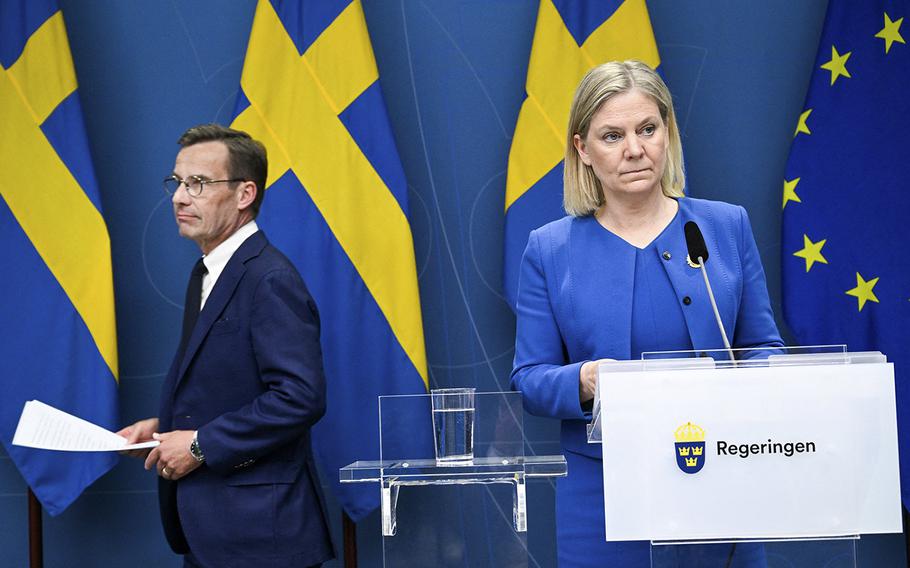
Sweden’s Prime Minister Magdalena Andersson, right, and the Moderate Party’s leader Ulf Kristersson arrive for a briefing in Stockholm on May 16, 2022. (Henrik Montgomery/TT News Agency/AFP via Getty Images/TNS)
STOCKHOLM — Sweden will continue efforts to persuade Turkey to lift its block on the entry of the largest Nordic country into defense alliance NATO after President Recep Tayyip Erdogan opened the door to Finland's accession.
Erdogan's decision on Friday to instruct the parliament to ratify the Finnish application dashed the Nordic countries' hopes of a parallel entry process. Hungary's announcement that it also plans to treat the bids separately cast further doubt on the timeline for Sweden's entry.
Speaking to reporters in Stockholm, Swedish Foreign Minister Tobias Billstrom said his government has done its part on fulfilling an agreement with Turkey the two Nordic countries signed in June last year, adding that it will continue to honor the deal.
"Sweden has done what it promised to do when signing the trilateral memorandum," Billstrom said. "We have no intent to do neither more nor less than what we have pledged to do."
The June agreement, which paved the way for Sweden and Finland's invitation to the North Atlantic Treaty Organization, included pledges from the Nordic countries to avoid arms embargoes on Turkey and do more to combat terrorism. However, relations between Ankara and Stockholm soured since then, with Turkey accusing Sweden of not doing enough to crack down on groups that it labels as terrorist.
Talks came to a standstill earlier this year after an effigy of Erdogan was hoisted upside down from a lamppost in Stockholm, and a Danish Swedish far-right activist burned a Koran outside of the Turkish embassy.
While Sweden has since moved toward introducing a tighter anti-terror legislation — after preparing it for years — and prevented at least two occasions of attempted Koran burnings, Erdogan continued to link Sweden's ratification to "concrete steps taken" by the country.
At a press conference in Ankara earlier Friday, the Turkish president also repeated his demand for Sweden to extradite people that Turkey calls terrorists.
"Sweden has opened its arms to terrorists," Erdogan said. "We have given them a list of approximately 120 terrorists and we asked them to send them to Turkiye."
Sweden's Supreme Court, which makes decisions on extradition requests, has rejected several appeals from Turkey on various grounds, including risk of persecution.
In December, the court blocked the extradition of Bulent Kenes, a former editor-in-chief of the oppositional Today's Zaman newspaper, which Turkey claims was tied to the Gulenist movement, believed to have orchestrated a 2016 coup attempt. Still, Sweden has at least on one occasion extradited a person wanted by Turkey.
Billstrom said Turkey can expect that decisions on extradition requests "can be either positive or negative, given that Sweden has an independent judiciary that deals with these issues without any involvement from the government."
Disappointing news
Being withheld entry after casting aside 200 years of policy to remain outside of military alliances is disappointing to Sweden, even as Prime Minister Ulf Kristersson had sought to prepare his country to the eventuality.
"Not gaining ratification at the same time as Finland is not good for Sweden," Magdalena Andersson, head of the opposition Social Democrats and prime minister at the time of the NATO application, told reporters. "It's also not good for NATO, both because it's harmful to NATO's open-door policy, but also because it makes it more difficult for NATO to defend Finland."
Finland's President Sauli Niinisto pledged to continue work to help Sweden's accession, telling reporters on Friday that "Finland's NATO membership is not complete without Sweden."
Speaking in an interview on YLE TV1 on Saturday, Niinisto said his country's interests require Sweden's NATO membership, adding that it would boost Finnish security.
©2023 Bloomberg L.P.
Visit bloomberg.com.
Distributed by Tribune Content Agency, LLC.